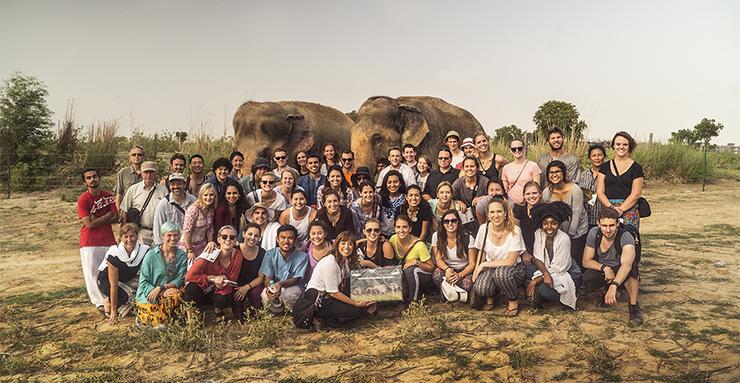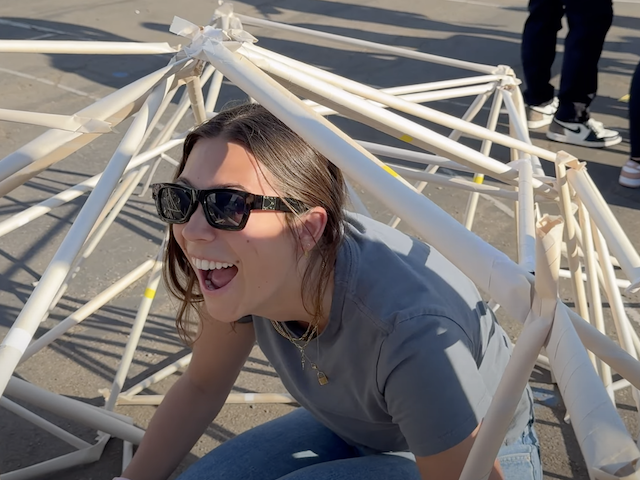USD Ranks Second Nationally for Undergraduate Study Abroad Participation
 The University of San Diego has earned the No. 2 national ranking among the Top 40 doctorate-granting universities, part of IIE's Open Doors Report on International Educational Exchange.
The University of San Diego has earned the No. 2 national ranking among the Top 40 doctorate-granting universities, part of IIE's Open Doors Report on International Educational Exchange. In a week in which the University of San Diego is already spotlighting the impact of international education (Nov. 13-17), the institution received a welcome addition — its newest national undergraduate study abroad ranking — to kick off the celebration.
The Institute for International Education's (IIE) 2017 Open Doors Report on International Educational Exchange announced that USD has earned the No. 2 national ranking for undergraduate participation in study abroad among the Top 40 Doctorate-Granting Universities.
The report, co-authored by the U.S. Department of State Bureau of Educational and Cultural Affairs, lists USD behind only Pepperdine University via an estimated study abroad participation percentage formula.* USD and Pepperdine are the only California universities in the Top 10. The rest of the Top 10, in order, are University of Notre Dame, University of Denver, Worcester (Mass.) Polytechnic Institute, University of St. Thomas (Minn.), Wake Forest University, New York University, American University and Shenandoah University.
“It’s an honor to be recognized as number two in the U.S. for the percentage of our students who study abroad,” said Denise Dimon, PhD, Associate Provost for International Affairs at USD. “This ranking is a tribute to the entire USD community and would not be possible without collaborations both within USD and internationally. This includes dedicated staff in the International Center, both in San Diego and at the USD Madrid Center, to our globally engaged faculty, supportive leadership, alumni, international partners and, of course, our students who inspire us to create more international opportunities to reinforce their desire for cross-cultural learning and building connections with others around the world.”
Consistently Evolving
The new ranking demonstrates USD’s continued strength in the area of international study. Since 2007, USD has been ranked in the Top 10 for the doctorate-granting universities category. Eight of the last nine years, USD has finished among the top three, including No. 1 in 2011 and 2012.
Study abroad has evolved since USD’s International Center opened in 2007. Located in Serra 201 along with the Office of International Students and Scholars, the center coordinates all undergraduate study abroad programs. Students can live and study in over 30 countries for a year, semester, summer or intersession while earning USD credit offered in more than 80 different programs. Students can participate in research, internships, community service learning, practicums and student teaching.
The 2014 opening of the Madrid Center, USD’s first permanent international academic facility, dual degree programs with an international component, and the International Center's role in the Second-Year Experience (SYE) Abroad Intersession program to cater exclusively to sophomore students are a few ways to achieve student success through international experiences.
“What is exciting about our study abroad opportunities are that there are so many ways to have an international academic experience,” Dimon says. “The first semester of freshman year, students can plan to study abroad in New Zealand or Italy with USD faculty and staff in their sophomore year, selecting from several core required courses being offered. How exciting to start planning in your freshman year to study the 'Science of Food and Cooking' in Florence, or 'Indigenous Peoples and the Environment' in New Zealand. These are just two examples of several courses available all four years for our undergraduate students.”
But regardless of where or when a student chooses to go abroad, doing it is sure to make a profound impact. “Study abroad prepares students to handle uncertainty and ambiguity, takes them out of their comfort zone, enhances language skills, and provides an opportunity to allow for an appreciation of different cross-cultural perspectives,” Dimon says.
Study Abroad and the Global Mindset at Work
Giuila Dugo ’16, who majored in marketing and international business, agrees. She recalls the importance of two Intersession courses — International Negotiations in Hong Kong in 2015 and Latin American Economics in Buenos Aires in 2016 — and still draws on them in her job as a marketing strategy manager for Adobe Systems in Seattle.
“Those two locations were the major subjects of my first interview with Adobe Systems for a position on their global team,” Dugo recalled. “We spoke about how I was able to test out the negotiating skills I learned in my International Negotiations class at the Hong Kong Night Market and how our class visit to Walmart in Buenos Aires helped me better understand Latin American economics.
“Fast forward to today and I use the lessons I learned in two very different countries on a daily basis. I work with people all over the world, internally and externally. At the core of my learning, acquisition of the global mindset has been most valuable in my career,” she continues. “Acquiring the global mindset has allowed my view of the world to go from 2D to 3D and has left me constantly asking myself, ‘I think about this problem or situation this way. But how might someone else in, say, Asia or Europe or Latin America view this?" That 3D view of the world? I truly thank my study abroad experience for providing it.”
Study Abroad Buy-In
Dugo's comments let Dimon and Kira Espiritu, PhD, director of USD’s International Studies Abroad programs, know how critically important a study abroad opportunity can be. Admissions and orientation sessions for study abroad information are always well attended, Espiritu said. Prospective students and parents crave this information when considering a school.
Espiritu sees USD’s success through many factors, but one in particular is the study abroad buy-in from faculty. “One thing that makes us unique is that we have nearly 50 different faculty-led courses annually. We have new faculty coming in and they want to do it. The diversity of departments who want to participate increases interest. We have departments looking for ways to incorporate study abroad into the curriculum and that diversifies options for students.”
But no matter how one sees USD’s study abroad program, having students go international just makes sense.
“At USD, we strongly value international experiences and perspectives and we bring these to USD students in several ways,” says Vice President and Provost Gail F. Baker. “Our faculty engage in international research with colleagues around the world. The University of San Diego strives to help our students be citizens of the world and contribute positively as global Changemakers."
— Ryan T. Blystone
* The IIE percentage formula this year divides the number of students who studied abroad in 2015-16 by the number of degrees conferred (excluding international students receiving degrees). Pepperdine had 681 study abroad students and 800 degrees conferred. USD had 979 students and 1,223 degrees conferred.



